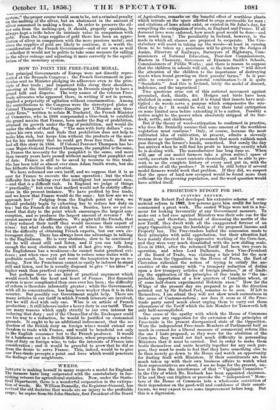WEEDS.
IRELAND is making herself in many respects a model for England. The farmers have long cooperated with the constabulary in fur- inshing returns for agricultural statistics. Now, under the Statis- tical Department, there is a wonderful cooperation in the extirpa- tion of weeds. Mr. William Donnelly, the Registrar-General, has revived the old doctrine that weeds are an injury to the profitable crops ; he copies from Sir John Sinclair, first President of the Board" of Agriculture, remarks on the baneful effect of worthless plants which intrude on the space allotted to crops serviceable for man ; and citations of laws which exist, or existed in Sir John's day, for compelling the extirpation of weeds, in England and France. If all dormant laws were enforced, how much good would be done—and how much harm ! The peculiarity in Ireland, however, is the mode in which all classes are prepared to cooperate. The Con- stabulary will assist in taking up the weeds—at least in causing them to be taken up • assistance' will be given. by the Judges of Assize, Directors of kailways, Surveyors of Highways, Com- missioners of National Education, Poor-law Commissioners, Masters in Chancery, Governors of Erasmus Smith's Schools, Commissioners of Public Works ; and there is reason to suppose that the children in schools will aid, as the teachers " will direct the attention of the children to the importance of destroying weeds when found growing on their parents' farms." Is it pos- sible to conceive a more general combination ?—it is quite " Socialistic." And this is Ireland, lately the model of discord, indolence, and the unpractical !
Two questions arise out of this national movement against grounded, dock, thistle, &. Hedges and birds have been abolished in some counties, and it is found that insects have mul- tiplied : do weeds serve a purpose which compensates the mis- chief they do ? It would be well to try their total extirpation on some limited area before extending it to a nation. Possibly a nation might be the poorer when absolutely stripped of its bur- dock, nettle, and chickweed.
But if the theory of weed-extirpation be oonfinned in practice, why does Mr. Donnelly assume that some amount of the worthless vegetation must continue ? Only, of course, because the most cultivated idea of cultivation, at present, admits a slovenly treatment as inevitable. It is presumed that much rubbish must pass through the farmer's hands, unnoticed. But surely the day
has arrived when he will find his profit in knowing exactly what he is dealing with. The manufacturer has long done so. When
will ;one of our model farmers take a given cubici I space of
earth;;-.ascertain its exact contents chemically, and be able to pre- sent. to us the complete history of every seed put in, with the
arithmetic of all the produce ? It would be still better if several model farmers would work that problem. If they did, we suspect that the space of land now occupied would be found more than sufficient for the growing population, and the weed question-would have settled itself.


























 Previous page
Previous page